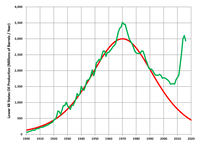
Conventual, easy to extract, cheap oil did diminish almost everywhere, except the Saudi reserves and we are not even sure about that, and for many years around 2010 we were burning oil at a higher rate than we discovered new sources but two things happened that hid the problems. These were the discovery of fracking practices in the USA which enabled the extraction of shale oil and propelled the USA into, once again, the biggest producer in the world, and the abundance and increasing use of gas.
A new book ‘Disruption. Hard Times in the 21st Century’ by Prof Helen Thompson of Cambridge University examines how the three pillars of Energy, Economics and Democracy are all intertwined and shape our macro world.
We all know that oil is a finite resource and we must run out eventually but because there are such huge finances involved in the production of oil and the massive economic and political consequence of every country that flow around it, that it is difficult to get real facts.
Russia produces about 14% of the worlds oil and gas supplies and supplies much of Europe’s supply of gas through pipelines that go through Ukraine but Germany and Russia have been building new pipes that go through the Baltic to reach Germany. The invasion of Ukraine has stopped that and now Europe realises that Russia is and unreliable trading partner and has declared policies that speed up the development of renewable energy and nuclear to reduce its dependence on Russia. This also brings forward the conversion to an electric economy which was bound to happen eventually anyway.
While all this happens the oil and coal industries, who have been a huge part of the worlds economy for a hundred years, are now having to relinquish this power to the new renewable energy companies which are much more scattered and located in each country independently.
New Zealand is typical of this shift in energy with an abundance of solar, wind, geothermal and hydro much of which is already in production. Rio Tinto at Tiwai point in Gore use 13% of our electricity production and get it really cheaply by threatening to leave but it might be better to let them go and use the electricity to start a hydrogen plant which we can then, either, use the hydrogen or export it and give the workers new employment.
This whole transition is going to be very disruptive as the power base of oil producing countries diminishes and new countries arise. The oil companies are not going to go quietly and will use their political clout to disrupt our democracy. This is not over by a long way.


 RSS Feed
RSS Feed